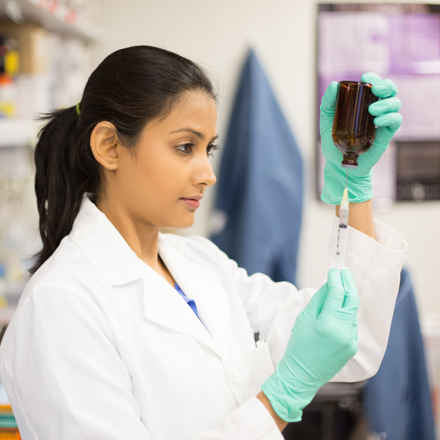
Our research projects
Since 1987 the Macular Society has invested around £10 million in over 100 research projects. Each year we invite applications for research grants, PhD studentships and seedcorn grants which are assessed by our Research Committee.
Research grants
Research grants are for projects of up to three years duration and up to £300,000, which covers everything from laboratory chemicals to salaries.
PhD studentships
A PhD studentship funds a student to undertake a three year research project. The student submits a thesis for qualification of the degree, which is the highest level of academic degree attainable.
Seedcorn projects
A seedcorn grant is funding of up to £25,000 to generate preliminary data to advance innovative and novel ideas.

Developing new anti-complement drugs for dry AMD
This study is aiming to find complement system inhibitor targets to stop damage to the macula that is associated with dry age-related macular degeneration (AMD).
Find out more

Investigating a possible gene therapy for dry AMD
Research into a gene therapy for dry age-related macular degeneration (AMD), which aims to maintain the health of an important macular cell layer.
Find out more

Understanding photopsia and photophobia in Stargardt disease
People with Stargardt disease may experience flashing lights in their vision (photopsia) or discomfort due to bright light or glare (photophobia). This work aims to better understand the prevalence, impact and cause of these symptoms.
Find out more

Understanding RPGR gene function in cone photoreceptors
This project aims to understand the function of the RPGR gene in photoreceptors, to understand why mutations lead to disease, and hopefully identify possible future treatment targets.
Find out more

Investigating Stargardt disease as a target for gene repair
This project will test whether a novel gene editing technique can repair a mutation that leads to Stargardt disease. The researchers are hoping to prove that a new technique called 'prime editing' may be able to successfully fix mutations that lead to the disease and treat the condition.
Find out more

Gene editing for Stargardt disease
This project will test whether a novel gene editing technique can repair a mutation that leads to Stargardt disease. The researchers are hoping to prove that a new technique called 'prime editing' may be able to successfully fix mutations that lead to the disease and treat the condition.
Find out more
